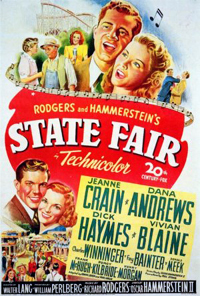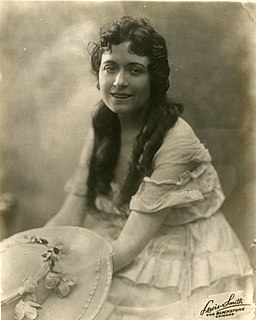Related Research Articles

Sex is a 1926 play written by and starring Mae West, who used the pen name "Jane Mast". Staged on Broadway, the play received bad reviews, but was a commercial success. It was eventually shut by the NYPD due to obscenity and West spent time in jail because of it.

The Nanny Diaries is a 2002 novel by Emma McLaughlin and Nicola Kraus, both of whom are former nannies. The book satirizes upper class Manhattan society as seen through the eyes of their children's caregivers.

The Bride is a 1985 period horror film directed by Franc Roddam, and starring Sting, Jennifer Beals, Geraldine Page, and Clancy Brown. Based on Mary Shelley's novel Frankenstein, the film follows Baron Charles Frankenstein who creates a woman, Eva, while his original monster—believed to have been killed in a laboratory accident—escapes into the countryside.

Olivia Reynolds is a fictional character in the DC Comics universe. She has a latent superpower, and has been abducted by various races who wanted to harness the power, and temporarily became a villainess. All memories of her experiences with the U-Mind have now been blocked after she was mindwiped.

Going Hollywood is a 1933 American pre-Code musical film directed by Raoul Walsh and starring Marion Davies and Bing Crosby. It was written by Donald Ogden Stewart and based on a story by Frances Marion. Going Hollywood was released by Metro-Goldwyn-Mayer on December 22, 1933.

Monica Quartermaine is a fictional character from General Hospital, an American soap opera on the ABC network, played continually since August 17, 1977 by longtime soap opera actress Leslie Charleson. She is a cardiologist at the eponymous hospital, and widow of physician Alan Quartermaine. The role was originated by Patsy Rahn in 1976, who played the role until showrunners replaced her with Charleson. Charleson's tenure with the serial is one of the longest in American soap operas.

The Tender Trap (1955) is a CinemaScope Eastman Color comedy directed by Charles Walters and starring Frank Sinatra, Debbie Reynolds, David Wayne, and Celeste Holm.

State Fair is a 1945 American Technicolor musical film directed by Walter Lang with original music by Rodgers and Hammerstein. It is a musical adaptation of the 1933 film of the same name, itself an adaptation of the 1932 novel by Phil Stong. The film stars Jeanne Crain, Dana Andrews, Dick Haymes, Vivian Blaine, Fay Bainter, and Charles Winninger. State Fair was remade in 1962, that time starring Pat Boone and Ann-Margret.

Hit the Deck is a 1955 American musical film directed by Roy Rowland and starring Jane Powell, Tony Martin, Debbie Reynolds, Walter Pidgeon, Vic Damone, Gene Raymond, Ann Miller, and Russ Tamblyn. It is based on the 1927 stage musical of the same name – which was itself based on the hit 1922 play Shore Leave by Hubert Osborne – and was shot in CinemaScope. Although the film featured some songs from the stage musical, the plot was different. Standards featured in the film include "Sometimes I'm Happy", "I Know that You Know", and "Hallelujah".
"Lucy Gray" is a poem written by William Wordsworth in 1799 and published in his Lyrical Ballads. It describes the death of a young girl named Lucy Gray, who went out one evening into a storm.

Monster literature is a genre of literature that combines good and evil and intends to evoke a sensation of horror and terror in its readers by presenting the evil side in the form of a monster.
"The Doctor" is the fifth episode of the second season of the American ABC fantasy/drama television series Once Upon a Time, and the show's 27th episode overall, which aired on October 28, 2012.

The Bride of Frankenstein is a fictional character first introduced in Mary Shelley's 1818 novel Frankenstein; or, The Modern Prometheus and later in the 1935 film Bride of Frankenstein. In the film, the Bride is played by Elsa Lanchester. The character's design in the film features a conical hairdo with white lightning-trace streaks on each side, which has become an iconic symbol of both the character and the film.
Good Girls Go to Paris is a 1939 American romantic comedy film starring Melvyn Douglas and Joan Blondell.

Mary Charleson was an Irish silent film actress who starred in about 80 films in the U.S. between 1912 and 1920.
Brona Croft, later known as Lily Frankenstein, is a character on Showtime's Penny Dreadful, portrayed by Billie Piper. Created by writer John Logan, Brona begins the series as an Irish immigrant living in London. An original take on the Bride of Frankenstein story, Piper's character and acting have been acclaimed by critics, calling her "alternately elegant, bewitching, coarse, and frightening."

"Greenbacks" is the fifth episode of the seventh season and the 138th episode overall of the American fantasy-drama series Once Upon a Time. Written by Christopher Hollier & Adam Karp and directed by Geofrey Hildrew, it premiered on ABC in the United States on November 3, 2017.

"The Eighth Witch" is the tenth episode of the seventh season and the 143rd episode overall of the American fantasy-drama series Once Upon a Time. Written by Jane Espenson & Jerome Schwartz and directed by Ralph Hemecker, it premiered on ABC in the United States on December 15, 2017.

"Knightfall" is the thirteenth episode of the seventh season and the 146th episode overall of the American fantasy-drama series Once Upon a Time. Written by Jerome Schwartz and Miguel Ian Raya and directed by Steve Miner, it premiered on ABC in the United States on March 16, 2018.

Ferdinando Eboli is a Gothic tale written by Mary Shelley and published in The Keepsake for 1829. It is set in Italy during the Napoleonic Wars and tells the story of an Italian man named Count Ferdinando Eboli whose identity is stolen by his illegitimate older brother.
References
- ↑ "The Strange Story of Sylvia Gray". American Film Institute. Retrieved September 7, 2021.
- ↑ "Sylvia Gray". Variety. October 31, 1914. p. 27. Retrieved September 6, 2021.
